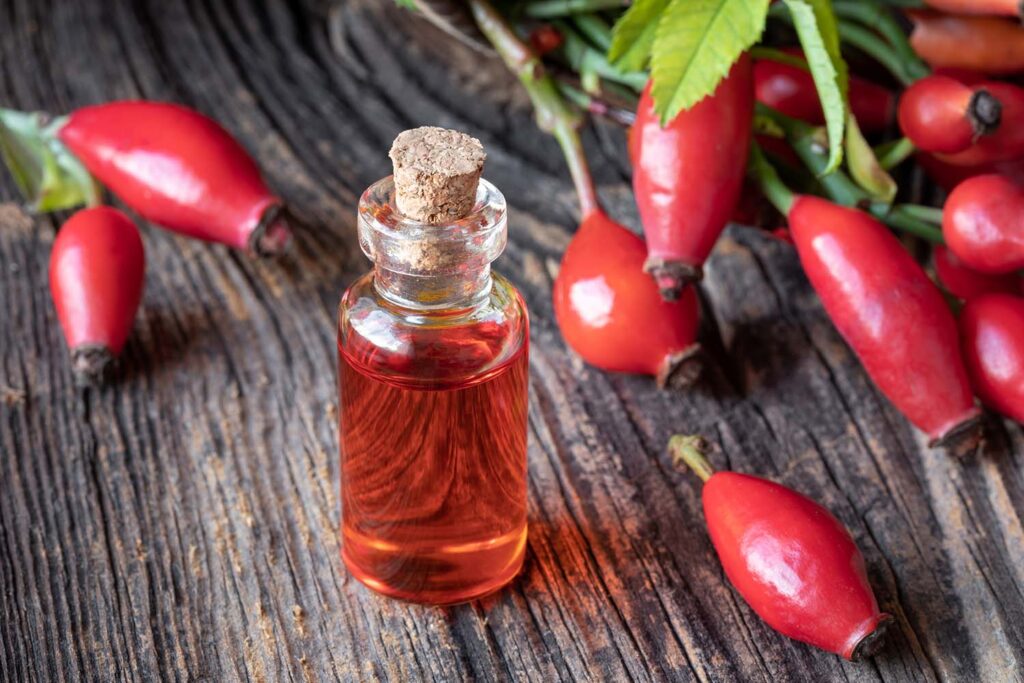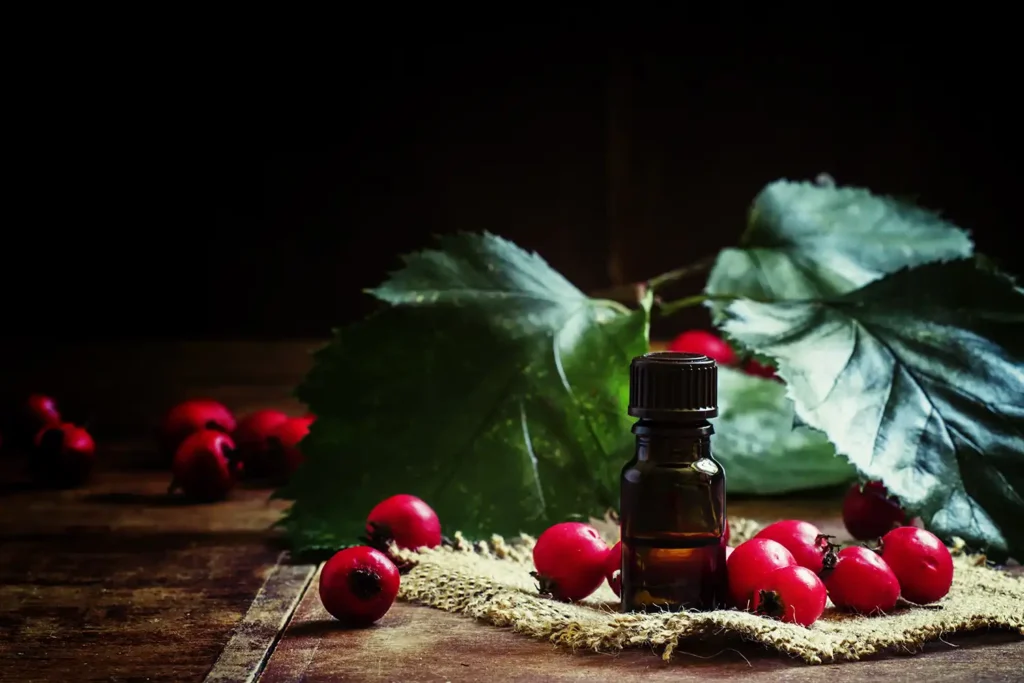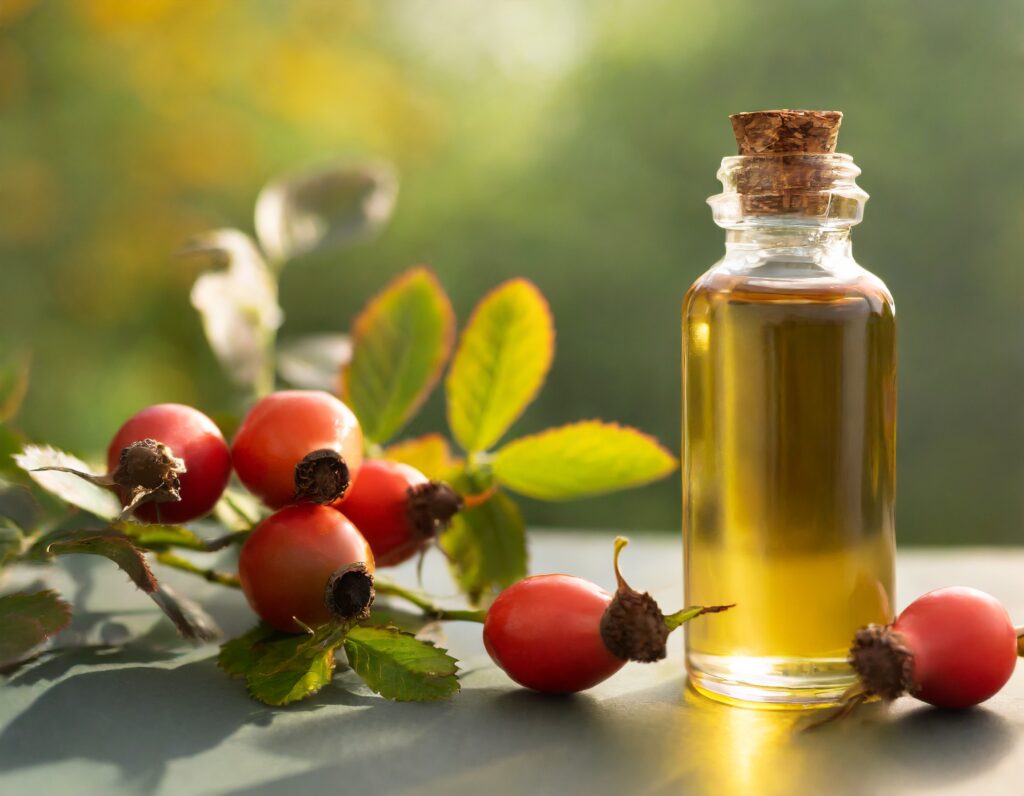Rosehip oil, a natural elixir for the skin, is a popular carrier oil in aromatherapy for its remarkable skin benefits. Derived from the seeds of the rose plant, this oil is a powerhouse of nutrients and has a history of use in various cultures for its therapeutic properties.
What is Rosehip Oil?
Rosehip oil, also known as rosehip seed oil, is extracted from the seeds of the Rosa canina rose bush, predominantly found in Chile.
It should not be confused with rose oil from the rose petals of the botanical Rosa damascena. Rosehip oil is derived from the fruit of the wild botanical species Rosa canina, Rosa moschata, / Rosa rubiginosa.
This oil is celebrated for its rich concentration of vitamins, antioxidants, and essential fatty acids, including linoleic acid, which are known for their skin-nourishing capabilities.
A Brief History of Rosehip Oil in Beauty and Healthcare
Historically, rosehip oil has been used for centuries as a natural remedy for various ailments. Its use dates back to ancient civilisations, including the Egyptians, Mayans, and Native Americans, who recognised its healing and rejuvenating properties.
In beauty care, it has been a secret ingredient for maintaining youthful skin, improving skin elasticity, and providing a natural glow.
Today, it continues to be a prized ingredient in skincare for its ability to hydrate, brighten, and revitalise the skin.


The Science Behind Rosehip Oil
Rosehip oil is more than just a traditional beauty remedy; it’s backed by science for its effectiveness in skin care. Understanding the components and how they work can help you appreciate why this oil is so beneficial for the skin.
Key Components – Essential Fatty acids
The magic of rosehip oil lies in its composition. It is rich in essential fatty acids, including omega-3 (linolenic acid) and omega-6 (linoleic acid), crucial for maintaining healthy skin barrier function and hydration.
Additionally, it’s a natural source of vitamin A (retinol), known for its anti-ageing and skin-brightening properties. The oil also contains vitamin E, an antioxidant that helps combat skin damage from free radicals.
What Percentage of Vitamin C is in Rosehip Oil?
Rosehip oil does not contain vitamin C. This is a common misconception. While fresh rosehips are rich in vitamin C, particularly in the skins, the seeds (from which rosehip oil is pressed) contain very little. Additionally, vitamin C is a water-soluble vitamin, which explains why rosehip oil, an oil-based product, does not contain much vitamin C.
The beneficial properties of rosehip oil for the skin, such as anti-ageing effects and fading scars and discolouration, are due to other components like beta-carotene, all-trans retinoic acid (a derivative of Vitamin A), and omega-3 and omega-6 fatty acids, not because of vitamin C content.
How Rosehip Oil Works on Your Skin
When applied to the skin, the nutrients in rosehip oil penetrate deep into the skin layers. The essential fatty acids help reinforce the skin’s barrier, locking in moisture and protecting against environmental damage.
Vitamin A stimulates collagen production, which is vital for skin elasticity and firmness, and helps reduce hyperpigmentation.
Together, these components work synergistically to improve skin texture, tone, and overall health, making rosehip oil a potent ingredient for various skin concerns.

Top Benefits of Rosehip Oil for Skin
Rosehip oil is celebrated for its multifaceted benefits for the skin. From hydrating dry skin to reducing signs of ageing, this natural oil offers a range of advantages for different skin types and concerns.
Hydration and Moisturisation
One of its primary benefits is its intense hydrating and moisturising properties. The high content of fatty acids, such as linoleic and linolenic acid, helps to protect the skin and maintain its moisture barrier, preventing water loss and keeping the skin soft and supple.
Anti-Ageing
Rich in vitamin A, rosehip oil is a natural ally in the fight against ageing. Vitamin A, or retinol, encourages skin cell turnover and boosts collagen production, reducing the appearance of fine lines and wrinkles.
Brightening and Reducing Hyperpigmentation
Rosehip oil is known for its skin-brightening effects. Thanks to its vitamin A content, it helps to even out skin tone and reduce the appearance of dark spots and hyperpigmentation. Regular use can lead to a more uniform and radiant complexion.
Healing Scars and Reducing Inflammation
The oil’s regenerative properties also make it effective in healing scars and helping to reduce inflammation. Its antioxidant content may help repair and regenerate damaged skin tissue, making it beneficial for those with acne scars, surgical scars, stretch marks or other forms of skin damage.
Acne Treatment and Prevention
Despite being an oil, rosehip is non-greasy and has anti-inflammatory properties, making it suitable for acne-prone skin. It may help regulate excessive oil production, reduce the occurrence of breakouts, and soothe existing acne inflammation.
How to Use Rosehip Oil Effectively
Incorporating rosehip oil into your skincare routine can be a game-changer for your skin’s health and appearance.
Here’s how to use this potent natural oil effectively for maximum benefits.
Application Tips for Maximum Benefits
To harness the full potential of rosehip oil, apply a few drops to clean, damp skin. This helps the oil penetrate more effectively. Gently massage it into your face and neck in upward strokes. Since it’s a dry oil, it absorbs quickly without leaving a greasy residue.
For an added boost, mix it with your favourite essential oil or use it under your night cream for overnight rejuvenation.
Adding Rosehip Oil to Your Skincare Routine
Rosehip oil can be used both in the morning and at night. In the morning, apply it after cleansing and before sunscreen and makeup. At night, use it after removing makeup and cleansing. It can be layered under heavier creams or blended with hazelnut oil for those with oilier skin. Remember, a little goes a long way!


Choosing the Right Rosehip Oil
Selecting the best pure rosehip seed oil is crucial to ensure you get the most out of this powerful natural ingredient.
Here are some key factors to consider when shopping for rosehip oil.
Factors to Consider When Buying Rosehip Oil
Quality is paramount when choosing rosehip oil. Look for cold-pressed, organic options, as these retain the most nutrients. The oil should be pure, without added ingredients or fillers, although some reputable suppliers may add vitamin E to prevent the oil from oxidation. Packaging is also important; opt for rosehip oil in dark glass bottles to protect it from light, which can degrade the oil’s quality.
Recommended Brands and Products
While many brands offer rosehip oil, choosing one with a good reputation for purity and sustainability is important. We currently recommend the following suppliers:


Potential Side Effects and Precautions
While rosehip oil is generally safe and well-tolerated, it’s important to be aware of potential side effects and take necessary precautions to ensure a positive experience.
Understanding Your Skin’s Reaction to Rosehip Oil
Most people can use rosehip oil without any adverse effects. However, as with any skincare product, there’s a chance of an allergic reaction, especially for sensitive skin. Signs of a reaction may include redness, itching, or a rash. Doing a patch test on a small area of skin is always recommended before using it extensively.
Dos and Don’ts When Using Rosehip Oil
Do a patch test before using it extensively, especially if you have sensitive skin.
Store the oil in a cool, dark place to maintain its potency.
Conclusion: Embracing Nature’s Gift for Radiant Skin
With its rich history and array of skin benefits, Rosehip oil stands out as a natural, effective solution for various skin concerns. Embracing this gift from nature can be a transformative step towards achieving healthier, more radiant skin. Its versatility and compatibility with different skin types make it a valuable addition to any skincare regimen, whether aiming for hydration, anti-ageing, or overall skin health.
Choosing rosehip oil is beneficial for your skin and a step towards sustainable beauty practices. By opting for a natural, minimally processed product, you support environmentally friendly practices and reduce your chemical footprint. Rosehip oil, in its purest form, is a testament to the power of simple, natural ingredients in providing effective skincare solutions.






